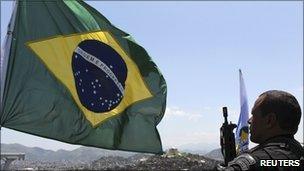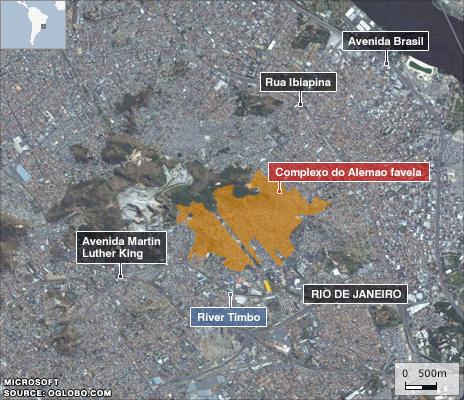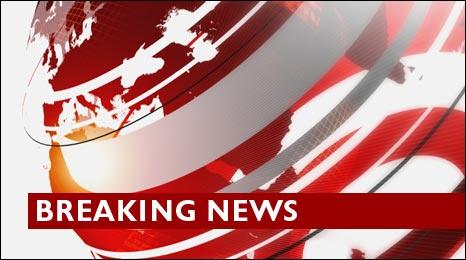Brazilian forces seize Rio drug trafficker stronghold
- Published
BBC's Tim Vickery: "They're looking to flush out heavily armed dealers"
Brazilian security forces have taken control of a major Rio de Janeiro drug trafficker stronghold.
Some 2,600 police and troops, backed by armoured vehicles and helicopters, moved into the Alemao complex of slums early on Sunday.
Drug traffickers had been given an ultimatum to surrender by sunset on Saturday or face an assault.
Exchanges of fire were heard but reports suggest that police were met with less resistance than expected.
Heavily-armed officers hoisted the Brazilian and police flags on the hilltop shanty-town of Alemao.
'We won'
Forces are now moving from house to house, searching the area for hundreds of alleged drug traffickers who police fear may be trying to escape through the sewage system.
Officers said that during their search of the area they had found the luxurious mansion of one an alleged drug dealer, complete with roof-top swimming pool and its own armoury.
The three-storey house with a sauna and disco was empty when the officers arrived and much of the electronic equipment inside had already been destroyed, police said.
Large amounts of weapons, ammunition and drugs were also seized.
The operation follows a week of clashes between security forces and suspected drug dealers in several slums in the Rio area, with drug gangs fighting back with gunfire and setting vehicles on fire. At least 45 people have been killed.
Brazilian authorities say it aims to make the city safer ahead of the World Cup in 2014 and Olympic Games in 2016.
But human rights activists have accused Brazil of being too heavy-handed in its approach.
Within hours of Sunday's operation, police said they had taken control of the favela.
"We won. We brought freedom to the residents of Alemao," said the head of Rio's military police, Mario Sergio Duarte.
"Now it is time to be patient. We've taken over the territory but it doesn't mean that we won't have confrontations with the gang members still inside.
"We have to be careful because they may be trying to set up traps for our men," he said.
Residents have been told to stay at home and there were still some reports of gunfire.
'Surrounded'
Paratroopers, marines and members of elite police units began to enter favela da Grota, part of the larger Alemao complex of slums in northern Rio, early on Sunday.
"We're entering the complex by four points. Alemao is surrounded and other troops are entering by other areas," the civil police chief, Allan Turnowski, told Brazil's Globo TV earlier.

Police raised the Brazilian flag after moving into the complex early in the morning
"A helicopter is involved in the offensive and another is filming the action, pointing out where drug traffickers are hiding. The majority are already hiding inside their houses," Mr Turnowski added.
Reports suggest that only 30 of about 500 to 600 drug traffickers in the area surrendered before Saturday's deadline.
The BBC's Tim Vickery in Rio says flushing out the heavily armed drug dealers is a complex task in a densely populated area, but that so far they have encountered less resistance than expected.
But, our correspondent says, if the authorities are winning this battle against the drug lords, they have yet to win the war.
'Militarised campaigns'
The suspected traffickers fled to Alemao from the Vila Cruzeiro favela after police took control of it earlier this week.
Eduardo Paes, the city's major, said the police were "giving the city back to its citizens".
"We will not give in until we have peace in Rio de Janeiro," he said.
But human rights organisation Amnesty International has accused police of being heavy-handed, and says it is concerned that innocent lives are at risk.
Patrick Wilcken, Amnesty's Brazil researcher, said he had just spoken to several residents in Alemao concerned about being hit by stray bullets.
"The police so far this week in operations in other communities have killed over 50 people, including in a tragic accident a 14-year-old girl.
"And one has to remember that this community has a long history of these very militarised campaigns by the police, and in 2007 the police did a huge operation, stormed the community and shot dead 19 people, and then left."

- Published28 November 2010
- Published26 November 2010
